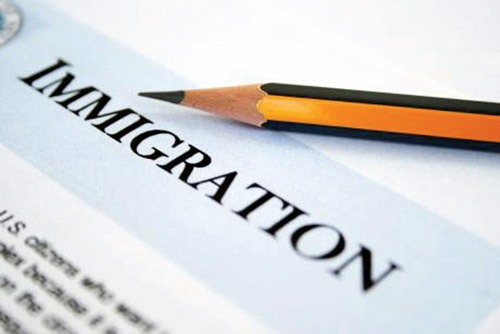
The mood in this country is increasingly anti-immigrant. This administration has taken a hard line against immigration, to put it mildly. Our law firm has been around for 60 years, but I never thought I would see Iranian doctors stopped at Kennedy Airport because of a blanket travel ban signed by the president overnight. Security concerns were the justification for excluding foreign nationals based on their country of origin, and indeed the Supreme Court concurred in its recent opinion upholding that policy in Trump v. Hawaii. But another justification for excluding foreign nationals is the fear that immigrants are taking our jobs. It is this fear that is most widespread and insidious. And it is not readily apparent whether it is well-founded.
Perhaps you have dropped off your son or daughter for their freshman year of college, and you have looked askance at the Asian and South Asian students. Those are the kids who will be studying on Friday night. They will probably make the grade and go to med school. After graduation, they will compete in the same labor market with our kids. These fears, real or imagined, are animating the political discourse. It is easy to give a knee-jerk assessment—“of course they are taking our jobs,” or “of course not, they are growing the economy!” In this day and age, it is worth asking the question—are foreign students affecting the wages and job prospects of U.S. workers?
As it happens, academia has studied the effects of foreign workers on the wages of U.S. workers for a long time. Gianmarco I.P. Ottaviano and Giovanni Peri surveyed this topic broadly in a white paper produced for the National Bureau of Economic Research, which is a well-respected repository of unbiased economic research. They concluded that immigration increases both labor participation and average wages for U.S. workers, but only where there is a difference in skill sets between the U.S. and foreign workers. However, if there is not a difference in skill sets, and foreign workers are able to substitute for U.S. workers, then average wages will decrease.
That is, if the U.S. and foreign workers are perfectly substitutable, then an influx of foreign workers will replace the U.S. workers and consequently depress wages for everyone. More workers on the same assembly line with the same exact skills will increase the labor supply, and depress wages. However, if that foreign worker is not directly substituting for the U.S. worker, but fulfilling a slightly different role than the U.S. worker, thus filling gaps in the labor market that would otherwise go unfulfilled, then all evidence points to a surprising conclusion: U.S. wages will increase, immigrant wages will increase and the economy will expand.
This makes sense in theory, in practice and anecdotally. If Elon Musk had not come to study in the United States and obtained a visa through employment, it would have been much less likely that PayPal, SpaceX and Tesla would come about. If Sergey Brin’s parents had not brought him here from the Soviet Union, perhaps we would have gotten Yahoo, but not Google. If Stanford’s electrical engineering PhD program does not have its pick of the international litter, then the students who are educated in the United States will return to their countries, and the next innovative multibillion dollar company will not emerge from the United States.
This crucial detail, the skill differential, currently guides much of employment-based immigration policy. Namely, the United States will hand you a visa if you bring unique skills to the table that are in short supply here. For example, in order to obtain permanent resident status, the Labor Department must first certify that the position that a foreign worker applies for cannot be filled by a U.S. worker. For O visas, you must show extraordinary ability.
This is the crucial piece, the skill differential, that determines whether immigrant workers expand our economy, create new companies, new opportunities, new jobs and raise our wages, or replace us with lower-paid workers. The answer is to fine tune our immigration laws, and their enforcement, to incorporate foreign students who develop unique skills into our workforce, and to discourage companies from exporting existing U.S. jobs to foreign workers merely because they will accept a lower wage. So long as we allow unique workers to participate in our economy, we will all reap the benefits of rising wages, new jobs and an expanding economy.
By Michael WildesBy Michael Wildes
Michael J. Wildes, a former mayor of Englewood, New Jersey, just won the primary election and will be the democratic nominee on the ballot for that position in November. He just authored a book entitled “Safe Haven in America: Battles to Open the Golden Door” and is the managing partner of Wildes and Weinberg, PC, specializing in immigration law, and a former federal prosecutor. The firm’s website is www.wildeslaw.com.










